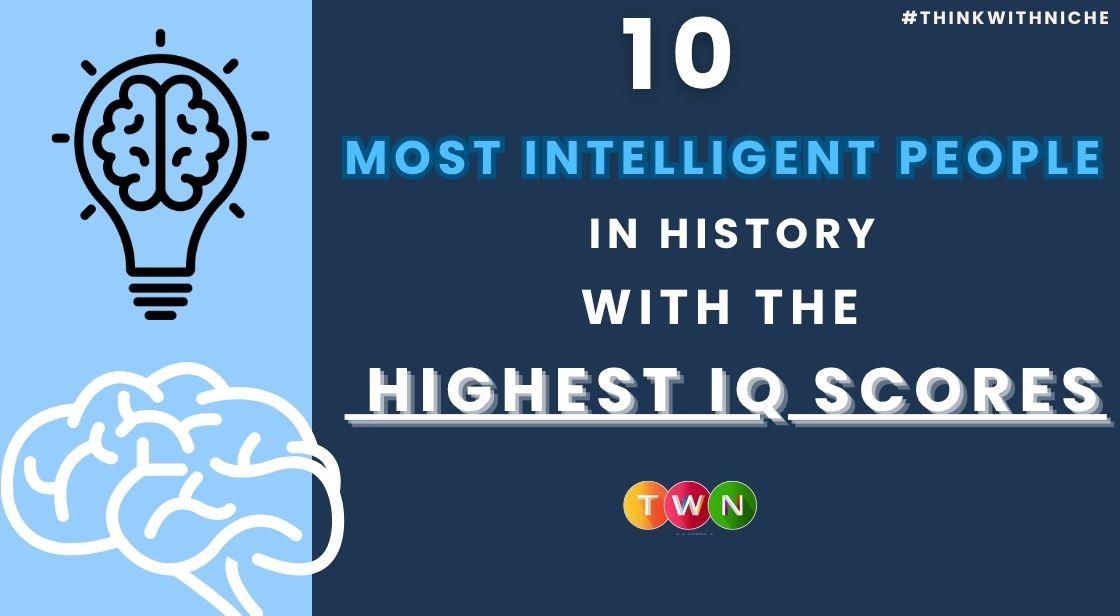10 Most Intelligent People in History with the Highest IQ Scores

Blog Post
Throughout history, a select group of individuals have possessed an intellectual capacity that transcends conventional understanding, leaving an indelible mark on our world.
While the concept of a single "highest IQ score" for historical figures is speculative—as modern intelligence tests did not exist—scholars and biographers have estimated their intellectual prowess based on their groundbreaking achievements and profound contributions across various fields.
These geniuses, whose minds operated on a different plane, pushed the boundaries of human knowledge in science, mathematics, art, and philosophy.
This article delves into the lives and legacies of ten such individuals who, with their extraordinary problem-solving abilities and creativity, are widely considered to have possessed some of the highest IQs in history.
From the polymathic genius of Leonardo da Vinci to the revolutionary theories of Albert Einstein and the mathematical brilliance of Carl Friedrich Gauss, their stories serve as a testament to the limitless potential of the human mind and continue to inspire generations to pursue knowledge and innovation.
Who Had the Highest IQ Ever? Meet the Top 10 in History
While historical IQ scores are speculative, as modern tests didn't exist, estimations based on their achievements, biographies, and problem-solving abilities offer a glimpse into the extraordinary minds that shaped history. These brilliant individuals pushed the boundaries of human knowledge and creativity, leaving behind a legacy that continues to inspire us today.
1. Johann Wolfgang von Goethe: The Quintessential Polymath
A German writer, scientist, and poet, Johann Wolfgang von Goethe is widely considered one of the greatest literary figures in history. His estimated IQ, ranging from 210 to 225, places him among the most intellectually gifted individuals ever.
Goethe's influence extended far beyond literature, with significant contributions to color theory, botany, and anatomy. His 1810 work, Theory of Colours, challenged Isaac Newton's optical theories and introduced a phenomenological approach to natural history.
He also developed a theory of plant morphology in his work Metamorphosis of Plants, in which he sought to understand the ideal form of a plant. His seminal work, Faust, is a cornerstone of German literature, while his extensive research on the natural world cemented his reputation as a true polymath.
He possessed an insatiable curiosity that drove him to explore and excel in multiple disciplines, leaving a legacy that continues to influence scientific and philosophical thought.
2. Leonardo da Vinci: The Renaissance Visionary
Leonardo da Vinci was a true giant of the Renaissance, renowned not just for his timeless masterpieces like the Mona Lisa and The Last Supper, but also for his groundbreaking work in science and engineering. His estimated IQ, between 180 and 220, reflects his insatiable curiosity and boundless creativity.
Da Vinci's notebooks are filled with pioneering designs and studies on anatomy, engineering, and physics, including detailed plans for flying machines, a rudimentary theory of plate tectonics, and intricate dissections of the human body that were centuries ahead of their time.
He embodied the spirit of the Renaissance, demonstrating how art and science could be intertwined to advance human knowledge and inspire innovation. His study of light and perspective, exemplified in paintings like the Mona Lisa, fundamentally changed how artists used these elements, leaving a lasting impact on art history.
3. Albert Einstein: The Architect of Modern Physics
Theoretical physicist Albert Einstein transformed our understanding of the universe with his theory of relativity. With an estimated IQ ranging from 160 to 190, Einstein revolutionized modern physics with his insights into time, space, and energy.
His work, which includes both special relativity (1905) and general relativity (1915), introduced concepts such as the space-time continuum, time dilation, and the famous equation E = mc². Beyond his scientific genius, Einstein was a profound thinker whose philosophical views on politics, human rights, and the nature of reality revealed a vast and compassionate intellect.
His intellect continues to influence scientific research globally and his name has become a synonym for genius itself. His theory of general relativity, in particular, has had philosophical significance by showing that space and time are not independent entities but a relational system that is descriptive of the physical world.
4. Sir Isaac Newton: The Prince of Science
Often hailed as the greatest scientist of all time, Sir Isaac Newton possessed an estimated IQ of 190 to 200. His contributions to calculus, the laws of motion, and universal gravitation formed the bedrock of classical mechanics and modern physics. Newton's ability to conceptualize and mathematically describe the intricate laws of the universe demonstrated an intelligence of the highest order.
His work in optics, specifically his experiments with light and prisms, and his development of calculus as a powerful mathematical tool continue to be cornerstones of scientific and academic pursuits.
5. Nikola Tesla: The Master of Invention
Nikola Tesla, an electrical engineer and inventor, was a visionary whose estimated IQ ranged from 160 to 310. His work with alternating current (AC) electricity is the foundation of modern power systems. Tesla's mind was a maelstrom of ideas, leading to inventions and concepts that were decades ahead of their time, including wireless communication, remote control, and the basics of radio technology.
Despite his incredible intelligence and countless inventions, his financial struggles often overshadowed his genius during his lifetime. His contributions to electromagnetism and electrical engineering, however, are now widely recognized as indispensable to modern technology.
6. William James Sidis: The Prodigy of Harvard
A child prodigy with an estimated IQ between 200 and 300, William James Sidis displayed extraordinary intellectual abilities from an early age. He was admitted to Harvard University at just 11 years old, where he captivated professors with his profound mathematical skills. Despite his unparalleled intelligence,
Sidis sought a life of anonymity, avoiding fame and dedicating himself to writing extensively on various topics under pseudonyms. His life story is a compelling chronicle of the unique challenges faced by an individual with such a high level of intellectual capacity, and a study in the complex relationship between genius and personal fulfillment.
7. Carl Friedrich Gauss: The Prince of Mathematicians
Known as the "Prince of Mathematicians," Carl Friedrich Gauss is estimated to have had an IQ between 250 and 300. His contributions to number theory, geometry, and statistics were revolutionary and laid the groundwork for modern mathematics.
Gauss demonstrated a superior analytical strength from an extremely young age, reputedly solving complex arithmetic problems in his childhood. His work also had a profound impact on physics, astronomy, and engineering, showcasing his ability to apply his mathematical genius to real-world problems.
8. Terence Tao: The Modern-Day Mathematical Marvel
An active and highly celebrated mathematician, Terence Tao is estimated to have an IQ between 225 to 230. A child prodigy, he began his academic career at a young age, earning his PhD at just 20. Tao's contributions to various areas of mathematics, including number theory, harmonic analysis, and random matrix theory, are groundbreaking and continue to set the agenda for mathematical research today.
His exceptional problem-solving abilities and groundbreaking work have earned him the Fields Medal, one of the highest honors in mathematics, and a place among the greatest minds in history.
9. Christopher Hirata: The Astrophysical Genius
Christopher Hirata, a child prodigy in physics, displayed exceptional intellectual prowess from a very young age. With an approximate IQ of 225, he was working with NASA on Mars mission projects at the age of 14. Hirata went on to earn a PhD from Princeton University and has made significant contributions to astrophysics and cosmology.
His work in gravitational lensing and the cosmic microwave background has advanced our understanding of the universe's evolution. His story is a testament to how early intellectual ability can translate into monumental contributions in a specific field.
10. Marilyn vos Savant: The Record-Breaking Mind
Marilyn vos Savant gained fame for being listed in the Guinness Book of World Records for having the highest recorded IQ of 228. She became a public figure through her popular "Ask Marilyn" column in Parade magazine, where she provided solutions to complex brain teasers and logical puzzles, including the famous Monty Hall problem.
Her ability to simplify and solve intricate problems in reasoning and logic has made her a symbol of intellectual prowess and a source of fascination for the general public, proving that exceptional intelligence is not confined to academia or science alone.
The Legacy of Exceptional Intelligence
The individuals on this list, whether their IQs were estimated or recorded, have left an invaluable legacy for all of humankind. Their contributions to science, mathematics, art, and philosophy continue to shape our world today.
While intelligence is a significant factor, their stories also highlight that greatness is ultimately defined by a combination of intellectual capacity, creativity, perseverance, and the determination to challenge the status quo. These great minds serve as an inspiration to future generations, reminding us that human potential is limitless when fueled by curiosity and a relentless pursuit of knowledge.
Their intellectual journeys instill in us a profound appreciation for the power of human ingenuity and the importance of continuously pushing the boundaries of what is known.
You May Like
EDITOR’S CHOICE












